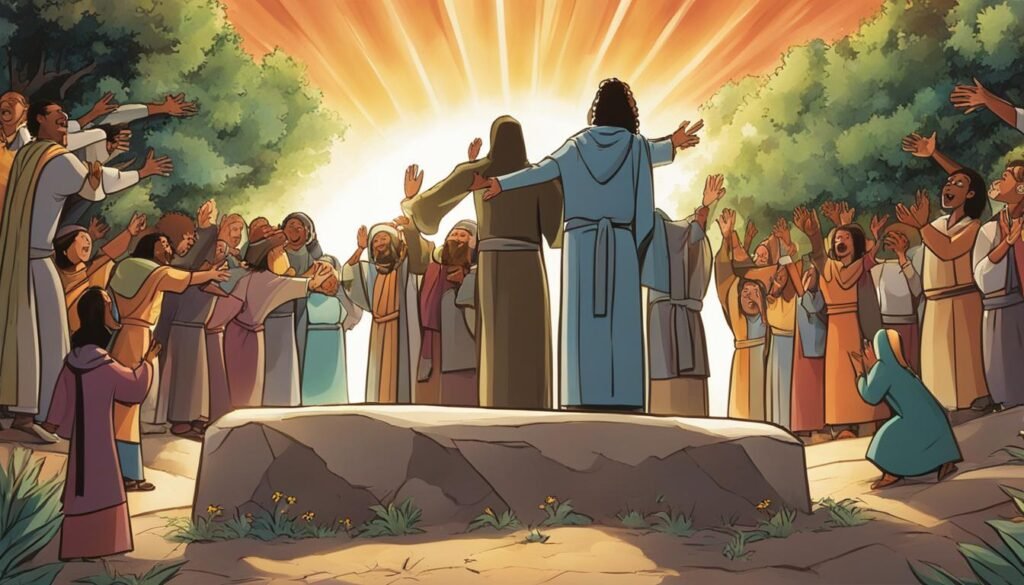After Jesus’ resurrection, He spent 40 days on earth. During this time, He spoke to His disciples and imparted important messages to them. These messages provided hope and shaped the foundations of their faith. Let’s explore what Jesus said to His disciples after His resurrection.
Key Takeaways:
- Jesus had important directions and words of encouragement for His disciples after His resurrection.
- His appearance to the disciples in a transformed spiritual body solidified their faith and removed doubts.
- Jesus addressed the doubts of Thomas and the other disciples, emphasizing the importance of faith.
- He commissioned His disciples to spread the good news and become witnesses in the world.
- Jesus assured His disciples of His continued presence and promised to send the Holy Spirit as their Helper.
Jesus’ Important Directions and Words of Encouragement
In Matthew 28:18-20, Jesus gave His disciples important directions. He proclaimed that all authority in heaven and earth had been given to Him. He instructed them to go and make disciples of all nations, baptizing them in the name of the Father, Son, and Holy Spirit. He also reminded them to teach obedience to everything He had commanded.
“Go therefore and make disciples of all nations, baptizing them in the name of the Father and of the Son and of the Holy Spirit, teaching them to observe all that I have commanded you. And behold, I am with you always, to the end of the age.”
Along with these directions, Jesus ended with words of encouragement, assuring His disciples that He would be with them always, even to the very end of the age. This gave them the confidence and strength to carry out the mission He had entrusted to them.
Jesus’ words of direction and encouragement continue to resonate with believers today, guiding them in their faith and empowering them to share the message of salvation with the world.
Rejoicing in the Resurrection
After Jesus’ resurrection, the disciples’ initial fear and despair turned into overwhelming joy. They had witnessed the miraculous event of Jesus returning to life, which dispelled their fears and brought them comfort. Over the next forty days, Jesus appeared to His disciples, teaching and interacting with them, further instilling joy and hope within their hearts.
During this period, Jesus’ presence and teachings filled the disciples with deep joy and an unshakable sense of gratitude. They were able to see and touch their resurrected Lord, reinforcing their belief in His victory over death and the promise of eternal life.

As Jesus prepared to ascend into heaven, in the presence of His disciples, instead of experiencing terror or sadness, they returned to Jerusalem rejoicing. Their rejoicing was a result of knowing that Jesus was alive, triumphing over death, and fulfilling the prophecies that had been foretold.
“So they worshiped him and returned to Jerusalem with great joy.” – Luke 24:52
This joy transformed their outlook and filled them with confidence. They were no longer burdened by fear but rather emboldened to continue the work that Jesus had entrusted to them: to spread the good news of His resurrection and share the message of salvation to the ends of the earth. Their hearts overflowed with joy as they embraced their role as witnesses to the power and love of Christ.
Joy became the driving force behind their actions and unwavering commitment to their mission. They understood that Jesus, in His resurrection, had conquered sin and death, offering hope and redemption to all who would believe.
Return to Jerusalem: A Testament of Joy
The disciples’ return to Jerusalem exemplified their genuine joy and unwavering faith in Christ. They were not consumed by doubt or fear but walked boldly in the assurance of His resurrection. This joy permeated the early Christian community, serving as a testament to the transformative power of encountering the risen Lord.
| Key Elements of Rejoicing in the Resurrection |
|---|
| – Witnessing Jesus’ return to life |
| – Forty days of personal interactions, teachings, and guidance |
| – Fulfillment of prophecies and assurance of victory |
| – Apostles’ rejoicing and return to Jerusalem with great joy |
Jesus’ Appearance to the Disciples
After His resurrection, Jesus appeared to His disciples in a different form. He no longer inhabited a physical body but had transformed into a spiritual body. Despite His spiritual form, He was able to appear and interact with His disciples. This appearance confirmed His resurrection and allowed the disciples to see and touch Him, removing any doubts they may have had. Jesus’ appearance to His disciples solidified their faith and affirmed His continued presence in their lives.
Jesus’ transformation into a spiritual body was a testament to the profound nature of His resurrection. In this new form, He transcended the limitations of the physical world, demonstrating His divine power and victory over death. By appearing to His disciples, Jesus provided them with irrefutable evidence of His resurrection, dispelling any uncertainties or skepticism.
“Peace be with you. As the Father has sent me, even so I am sending you.” – Jesus (John 20:21)
Through His appearance, Jesus reassured His disciples that He was indeed alive and present with them. His spiritual body allowed Him to be present in their midst, providing comfort, guidance, and instruction. The disciples witnessed firsthand the reality of Jesus’ resurrection, and this experience deeply impacted their faith.
This appearance also highlighted the continuity between Jesus’ earthly ministry and His post-resurrection ministry. Although in a different form, Jesus’ appearance affirmed His ongoing mission and presence in the lives of His disciples. He continued to teach and mentor them, equipping them for the task of spreading the message of salvation.
Jesus’ appearance to His disciples served as a transformative and faith-affirming experience. It solidified their belief in His resurrection and established a firm foundation for the early church. The disciples, now certain of Jesus’ victory over death, embarked on their mission with renewed fervor and conviction.
Jesus’ Spiritual Body
Jesus’ spiritual body was not bound by the limitations of a physical body. It allowed Him to transcend time and space, appearing to His disciples at various locations and times. This supernatural manifestation emphasized His divine nature and affirmed His continued presence with His followers.
- Jesus’ spiritual body bore the wounds of His crucifixion, providing physical evidence of His suffering and victory over sin. This tangible proof further solidified the disciples’ faith in His resurrection.
- Jesus’ spiritual body was not constrained by physical barriers. He appeared to His disciples behind locked doors, demonstrating His supernatural ability to transcend physical obstacles.
- Jesus’ spiritual body was recognizable to His disciples. They could see, touch, and interact with Him, confirming His identity and reinforcing their belief in His resurrection.
Jesus’ appearance in a spiritual body underscored the spiritual nature of His kingdom and the eternal significance of His resurrection. It foreshadowed the future resurrection of believers, when they too will receive spiritual bodies and experience the fullness of eternal life with Him.
Jesus’ Words to Thomas and the Doubters
Jesus’ resurrection was met with doubt and disbelief by some of His disciples, including Thomas. Thomas expressed his skepticism, stating that he would not believe unless he saw the wounds of Jesus and touched them with his own hands.
Jesus did not dismiss Thomas’ doubts, but instead appeared to him and invited him to do exactly what he had asked. In John 20:27, Jesus said to Thomas, “Put your finger here; see my hands. Reach out your hand and put it into my side. Stop doubting and believe.” This interaction with Thomas served as a powerful testament to the reality of His resurrection.
“Because you have seen me, you have believed;
blessed are those who have not seen and yet have believed.”
Jesus’ words to Thomas not only addressed his doubts but also carried a broader message for all those who struggle with belief. He acknowledged that faith requires trust in the unseen and highlighted the unique blessing bestowed upon those who believe without physical proof. It is through faith that individuals can fully experience the transformative power of Jesus’ resurrection.
Jesus’ words to the doubters among His disciples serve as a reminder that belief and faith extend beyond tangible evidence. They underscore the importance of trust, spiritual conviction, and a personal relationship with Jesus. Through His compassionate response to Thomas, Jesus showed that doubts can be met with understanding and reassurance, ultimately leading to a deeper faith.
The Importance of Faith in Overcoming Doubt
Doubt is a natural part of the human experience, and even the most steadfast believers may wrestle with it at times. Jesus’ interaction with Thomas demonstrates that doubts can be addressed, and faith can be strengthened through personal encounters with the risen Savior.
In the face of doubt, Jesus encourages His followers to rely on faith, which surpasses what can be seen or proven. He invites them to believe in His resurrection, despite the absence of physical evidence, and assures them of the blessings that come from such unwavering faith.
By addressing the doubts of Thomas and the other disciples, Jesus showed His unwavering love and patience. His words resonated with believers then and continue to resonate with individuals today who grapple with uncertainty or wavering faith.
The Ongoing Message of Belief and Faith
Jesus’ words to Thomas and the doubters hold relevance and significance for believers throughout the ages. They inspire individuals to confront their doubts and choose faith, to embrace the unseen and trust in the promises of Jesus.
Today, Jesus’ message to Thomas serves as an encouragement to those struggling with doubt. It reminds believers that their faith should not be contingent on physical proof but rooted in a personal relationship with Jesus Christ. Through this relationship, doubts can be turned into unwavering belief, strengthening the foundation of faith.
| Jesus’ Words to Thomas and the Doubters | |
|---|---|
| Addressing Thomas’ doubts and inviting him to touch His wounds | John 20:27 |
| Highlighting the blessedness of those who believe without seeing | John 20:29 |
| Emphasizing the importance of faith and trust in the unseen | John 20:29 |
| Encouraging believers to confront their doubts and choose faith | John 20:27-29 |
Jesus’ words to Thomas and the doubts exemplify His unwavering love, compassion, and understanding. They provide comfort and assurance to believers, reminding them that faith can overcome doubt and lead to a deeper relationship with Jesus.
Jesus’ Commission to His Disciples
After His resurrection, Jesus entrusted His disciples with a crucial task – to spread the message of His death and resurrection to all nations. He commissioned them to be witnesses of the transformative power of His message, preaching repentance and forgiveness of sins in His name. This commission marked the beginning of their mission to bring salvation and hope to the world.
Jesus emphasized the importance of starting from Jerusalem, the birthplace of their faith, and then expanding their preaching to the ends of the earth. He knew that their witness would ignite a chain reaction, leading others to hear the life-changing message of the Gospel.
“But you will receive power when the Holy Spirit comes upon you, and you will be my witnesses in Jerusalem, and in all Judea and Samaria, and to the ends of the earth.” – Acts 1:8
With this commission, Jesus entrusted His disciples with the immense responsibility of continuing His work on earth. He recognized their potential to create a ripple effect that would shape the course of history.
To help illustrate the significance of this commission, here is a table showcasing the actions Jesus instructed His disciples to take:
| Disciples’ Commission | Actions |
|---|---|
| Be Witnesses | Proclaim the message of repentance and forgiveness of sins in Jesus’ name. |
| Start from Jerusalem | Begin spreading the Gospel in the city where Jesus was crucified and resurrected. |
| Reach All Nations | Take the message of salvation to all corners of the world. |
Through this commission, Jesus empowered His disciples to continue His transformative work, ensuring that His message of love and redemption would reach the farthest corners of the earth.

By fulfilling their commission, the disciples became instrumental in laying the foundation of the early Church and spreading the Good News to future generations. As believers today, we are called to follow in their footsteps, continuing to be witnesses of Jesus’ life, death, and resurrection, and sharing His message of hope, grace, and salvation with all.
The Assurance of Jesus’ Continued Presence
Before ascending to heaven, Jesus assured His disciples that He would always be with them. He promised to send them the Holy Spirit, the Helper, who would empower and guide them in their mission.
This promise of His continued presence filled the disciples with confidence as they embarked on their mission to spread the gospel and make disciples.
Image depicting the presence of Jesus with His disciples, providing them with confidence and guidance in their mission.
The Fulfillment of Prophecy
Jesus reminded His disciples that His death and resurrection fulfilled prophecies written in the Law of Moses, the Prophets, and the Psalms. He opened their minds to understand the Scriptures and how His life and work were foretold. By acknowledging the fulfillment of prophecy, Jesus reinforced the significance of His death and resurrection and strengthened the disciples’ faith in His divine purpose.

“Do not think that I have come to abolish the Law or the Prophets; I have not come to abolish them but to fulfill them.” – Matthew 5:17
The Impact of Jesus’ Words on the Early Church
The words Jesus spoke to His disciples after His resurrection had a profound impact on the early church. His teachings and commissioning shaped their mission and propelled them to spread the gospel throughout the world. The disciples carried Jesus’ words with them as they established and guided the early Christian communities, laying the foundation for the growth and development of the church.
| Impact | Description |
|---|---|
| Formation of Early Christian Communities | The disciples, driven by Jesus’ words, played a crucial role in the formation and guidance of early Christian communities. They established local assemblies, appointed leaders, and taught the teachings of Jesus. |
| Expansion of the Gospel | Empowered by Jesus’ commission to go and make disciples of all nations, the disciples spread the message of salvation and forgiveness to diverse regions, leading to the rapid growth of the early church. |
| Emphasis on Discipleship | Jesus’ words instructed the disciples to teach obedience to everything He had commanded. This emphasis on discipleship became a fundamental aspect of the early church, shaping the way new believers were mentored and trained. |
| Christian Unity | Jesus’ teachings on love, forgiveness, and unity influenced the early church’s sense of community and fellowship. Believers embraced a shared identity as followers of Christ, transcending societal divisions. |
As the early church grew, the impact of Jesus’ words continued to shape its theology, practices, and mission. Christians found strength and guidance in His teachings, which formed the basis of their faith and served as a beacon of hope for future generations.
Conclusion
Jesus’ words to His disciples after His resurrection were of paramount importance, providing them with hope, reassurance, and guidance. These messages shaped and solidified the foundations of their faith, empowering them to continue Jesus’ mission in the world.
The appearance and teachings of Jesus after His resurrection imbued His disciples with the confidence and conviction to carry out His work. His words served as a compass, guiding them in spreading the message of salvation and building the early Christian communities.
Today, the messages Jesus imparted to His disciples continue to inspire and guide Christians worldwide. They remind us of the enduring presence and power of our risen Lord, instilling faith and perseverance in the face of challenges. The resurrection of Jesus remains a central pillar of Christian belief, offering a beacon of hope and salvation to all who embrace His teachings.
FAQ
What directions did Jesus give to His disciples after His resurrection?
Jesus proclaimed that all authority in heaven and earth had been given to Him. He instructed His disciples to go and make disciples of all nations, baptizing them in the name of the Father, Son, and Holy Spirit. He also reminded them to teach obedience to everything He had commanded. Additionally, Jesus assured them that He would be with them always, even to the very end of the age.
How did the disciples respond to Jesus’ resurrection?
Initially, the disciples were fearful and despairing. However, after witnessing Jesus’ return to life, their fear turned into overwhelming joy. The knowledge of Jesus’ resurrection drove away their fear and comforted them. They rejoiced and returned to Jerusalem with confidence, knowing that Jesus was alive in heaven and would be with them.
In what form did Jesus appear to His disciples after His resurrection?
Jesus appeared to His disciples in a spiritual body, no longer inhabiting a physical form. Despite His transformed state, He was able to physically manifest Himself and interact with His disciples. His appearance confirmed His resurrection and removed any doubts the disciples may have had about His resurrection.
How did Jesus address the doubts of Thomas and the other disciples?
Jesus specifically appeared to Thomas and invited him to touch His wounds, addressing his doubts and reassuring him. Jesus emphasized that those who believed without seeing were blessed. His words served as a reminder that faith requires trust and belief in the unseen.
What was Jesus’ commission to His disciples?
Jesus commissioned His disciples to spread the good news of His death and resurrection. He instructed them to be witnesses and to preach repentance and forgiveness of sins in His name to all nations, beginning from Jerusalem. He entrusted them with the task of sharing the transformative message of salvation and becoming His witnesses in the world.
Did Jesus promise to be with His disciples after His ascension?
Yes, before ascending to heaven, Jesus assured His disciples that He would always be with them. He promised to send them the Holy Spirit, the Helper, who would empower and guide them in their mission. This promise of His continued presence filled the disciples with confidence as they spread the gospel and made disciples.
How did Jesus reinforce the significance of His death and resurrection?
Jesus reminded His disciples that His death and resurrection fulfilled prophecies written in the Law of Moses, the Prophets, and the Psalms. He opened their minds to understand the Scriptures and how His life and work were foretold. By acknowledging the fulfillment of prophecy, Jesus strengthened the disciples’ faith in His divine purpose.
How did Jesus’ words impact the early church?
The words Jesus spoke to His disciples after His resurrection had a profound impact on the early church. His teachings and commissioning shaped their mission and propelled them to spread the gospel throughout the world. The disciples carried Jesus’ words with them as they established and guided the early Christian communities, laying the foundation for the growth and development of the church.
What was the significance of Jesus’ words to the early believers?
Jesus’ words after His resurrection provided hope, reassurance, and guidance to the early believers. His appearance and teachings empowered His disciples to carry out His mission and continue His work in the world. The messages Jesus imparted to His disciples continue to inspire and guide Christians today, reminding us of the enduring presence and power of our risen Lord.
Source Links
- https://kidscorner.net/bible-stories/jesus-appears-to-his-disciples
- https://www.biblegateway.com/passage/?search=Luke 24:36-49&version=NIV
- https://www.holyspiritspeaks.org/gospel/resurrection-of-jesus/

I’m Benjamin, a passionate spiritual seeker and creator of Verses and Prayers. Alongside my girlfriend Emma and our pet lizard Mulle, I cherish family life, enjoy exploring new places, and am deeply involved in my church community. My love for reading and singing biblical verses inspires every aspect of my journey.

